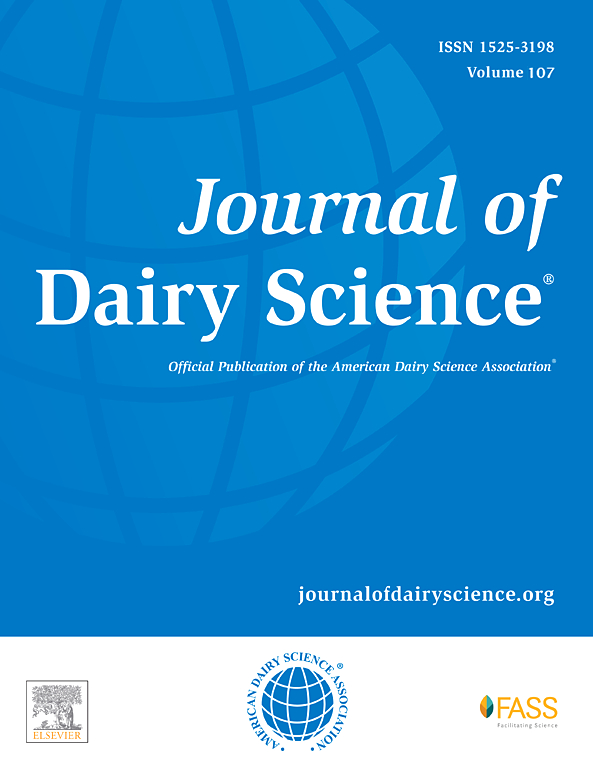A focus group study exploring necessary competencies and contextual factors for effective antimicrobial stewardship on dairy farms
IF 3.7
1区 农林科学
Q1 AGRICULTURE, DAIRY & ANIMAL SCIENCE
引用次数: 0
Abstract
There is a need for improved antimicrobial stewardship on dairy farms, and changes will be largely enacted by the farm workers who are responsible for carrying out farm procedures. For this reason, efforts directed at educating and enabling farm workers in antimicrobial stewardship are necessary for compliance with farm-level antimicrobial usage policies. Therefore, the objectives of this research were (1) to determine the competencies needed by dairy farm workers to implement antimicrobial stewardship and to inform educational resource development and (2) explore the farm contexts that influence farm worker antimicrobial stewardship capabilities. Initially, focus group discussions were conducted in person with 6 groups of veterinarians at 3 independent conferences held in the United States. To gain additional perspectives, 2 focus groups were conducted via video link with dairy producers from the midwestern United States. The focus groups had 4 to 8 participants and 2 to 4 facilitators each, and were audio recorded and transcribed for analysis. Discussions were audio recorded, transcribed, and evaluated using inductive thematic analysis, with 9 key themes identified. Participants emphasized that farm workers needed to be willing to learn, to be responsible, and to be consistent in their execution of tasks. Furthermore, farm workers needed knowledge about the rationale behind antimicrobial use strategies and disease mitigation practices. General skills needed by farm workers included good communication, excellent observation, and the ability to follow protocols and keep records. Technical skills required by farm workers related to the handling of animals, attention to cleanliness, ability to properly administer pharmaceutical products, and farm equipment maintenance. The skills and knowledge required differed among farm workers depending on their responsibilities and experience, with greater expectations for herd managers compared with employees who specialized in a specific task such as milking. Farm contexts that affected antimicrobial stewardship included the farm size, which had an impact on the 3 other themes: workplace culture, leadership, and tools. Workplace culture encompassed having an approachable environment and clear responsibilities, and leadership encompassed managerial capacity and veterinary support. Important tools for effective antimicrobial stewardship included relevant and up-to-date protocols, technology, equipment, and a proficient workforce. The evidence provided through these focus groups is useful for informing competency-based educational efforts aimed at improving antimicrobial stewardship on dairy farms.
焦点小组研究探索必要的能力和背景因素,有效的抗菌剂管理的奶牛场。
有必要改善奶牛场的抗菌药物管理,这些变化将主要由负责执行农场程序的农场工人实施。因此,必须努力对农场工人进行抗微生物药物管理方面的教育和培训,以遵守农场一级的抗微生物药物使用政策。因此,本研究的目的是:1)确定奶牛场工人实施抗菌药物管理所需的能力,并为教育资源开发提供信息;2)探索影响农场工人抗菌药物管理能力的农场环境。最初,在美国举行的3次独立会议上,与6组兽医进行了面对面的焦点小组讨论。为了获得更多的观点,通过视频链接与美国中西部的乳制品生产商进行了两个焦点小组的讨论。焦点小组有4-8名参与者和2 - 4名主持人,并被录音和转录以供分析。讨论录音,转录,并使用归纳主题分析进行评估,确定了9个关键主题。与会者强调,农场工人需要愿意学习,负责任,并在执行任务时保持一致。此外,农场工人需要了解抗菌素使用战略和疾病缓解做法背后的原理。农场工人所需的一般技能包括良好的沟通、出色的观察力、遵守协议和保存记录的能力、农场工人所需的与处理动物有关的技术技能、注意清洁、正确管理药品的能力以及农场设备维护。根据职责和经验的不同,农场工人所需的技能和知识有所不同,与专门从事特定任务(如挤奶)的雇员相比,对牧群管理人员的期望更高。影响抗菌药物管理的农场环境包括农场规模,这影响了其他3个主题:工作场所文化、领导力和工具。工作场所文化包括平易近人的环境和明确的责任,而领导力包括管理能力和兽医支持。有效抗菌药物管理的重要工具包括相关的和最新的协议、技术、设备和熟练的工作人员。通过这些焦点小组提供的证据有助于为旨在改善奶牛场抗菌药物管理的基于能力的教育工作提供信息。
本文章由计算机程序翻译,如有差异,请以英文原文为准。
求助全文
约1分钟内获得全文
求助全文
来源期刊

Journal of Dairy Science
农林科学-奶制品与动物科学
CiteScore
7.90
自引率
17.10%
发文量
784
审稿时长
4.2 months
期刊介绍:
The official journal of the American Dairy Science Association®, Journal of Dairy Science® (JDS) is the leading peer-reviewed general dairy research journal in the world. JDS readers represent education, industry, and government agencies in more than 70 countries with interests in biochemistry, breeding, economics, engineering, environment, food science, genetics, microbiology, nutrition, pathology, physiology, processing, public health, quality assurance, and sanitation.
 求助内容:
求助内容: 应助结果提醒方式:
应助结果提醒方式:


